- Home
- Carl Deuker
Night Hoops
Night Hoops Read online
Night Hoops
Carl Deuker
* * *
Houghton Mifflin Company
Boston
* * *
Copyright © 2000 by Carl Deuker
All rights reserved. For information about permission to reproduce
selections from this book, write to Permissions, Houghton Mifflin
Company, 215 Park Avenue South, New York, New York 10003.
www.hmco.com/trade
The text of this book is set in 10.5 point Slimbach.
Library of Congress Cataloging-in-Publication Data
Deuker, Carl.
Night hoops / Carl Deuker.
p. cm.
Summary: While trying to prove that he is good enough to play
on his high school's varsity basketball team, Nick must also
deal with his parents' divorce and the erratic behavior of a troubled
classmate who lives across the street.
ISBN 0-395-97936-6
[1. Basketball—Fiction. 2. Divorce—Fiction. 3. Behavior—Fiction.
4. Friendship—Fiction.) I. Title.
PZ7.D493 Ni 2000
[Fic]—dc21
99-047882
Manufactured in the United States of America
QUM 10 9 8 7 6 5
* * *
For Anne and Marian;
and for Ratty, Striper, Gigi, Phantom, and Trixie
The author would also like to thank Ann Rider,
the editor of this book, for her support and advice.
Part One
Chapter 1
Against the fast break, you have to stop the ball. That's rule number one, even if it's Trent Dawson, eyes wild, who's barreling down the lane at you, and even if it's just a summer pick-up game. You've still got to suck it up and do it. So I challenged him, holding my position, feet set.
With the advantage in numbers he had, a simple bounce pass would have given one of his teammates the easy two points. Trent knew that, because he was a player. Or he could have been a player, if he ever played right. But Trent Dawson never did anything right.
Instead of passing off, he crashed right into me, planting his knee into my chest. I toppled backwards, and he came down hard on top of me. My head smacked the asphalt just as the ball rolled in. "That was a charge," I yelled, still pinned under him. "The basket doesn't count."
His hand came right back to my face, his fingers squeezing my cheeks and almost gouging my eyes. "No way, Abbott. No way."
Every guy on the court knew he was cheating, but nobody backed me. I can't blame them, because the one thing worse than having Trent Dawson squeeze your face would be to have him pound it to a bloody pulp. And he'd do it, too. He'd do it and he'd enjoy it.
"Take the points," I sputtered, pushing his hand away, "but you fouled me and you know it."
He grinned as he climbed off me. It was his way of letting me know that he did know it.
The game ended in a typical Dawson way. We were playing to twenty. My team had the ball with the score tied at eighteen when Trent's older brother Zack showed up. Trent is bad news, but Zack is worse, both meaner and crazier. Word is that he has a gun that he stole from one of his mother's many, many boyfriends.
"Hey, Trent. Let's go," he shouted from across the court.
Immediately, without so much as a "Good game" or a "See you later," Trent was gone, leaving the rest of us with sweat dripping down our faces and backs, our mouths hanging open. "What a total jerk," one of the guys said, but not until Trent was out of earshot.
The joke is that last year, when Trent first moved into the rental house across the street from us, I was keyed up about it. A guy my age, who looked pretty athletic—it was perfect. Dad knew, though. He never liked the Dawsons. "Freeloaders" is what he called them, because they were on welfare. "There'll be trouble. Mark my words."
Mom, who is a nurse at the county hospital and sees a lot of poor people, defended them. "Not having money doesn't make you a criminal."
Dad grinned. "Just wait. In six months you'll be singing a different tune."
Normally Mom isn't all that outgoing, but she made a point of welcoming Ericka Dawson to the neighborhood, calling out "hello" to her in the morning and encouraging me to do stuff with Trent.
But Dad turned out to be right. On our block everybody mows the lawn, plants flowers, and picks up stray bits of trash. People wave to their neighbors, keep their music down, and drive slowly, at least until they hit the main streets.
It didn't take long to see that Ericka Dawson was different. She let the lawn and flower beds go. Her front porch became a garbage heap, and if anything broke, it stayed broken. She had people over all the time, and they partied late and loud. Strange cars and motorcycles were always roaring up and down our block.
When the Dawsons moved in, the inside of the house had been clean and neat. Within three months the place was a total dump, and I mean total. I still remember the first time I was inside that house. Trent had me over to play pool on what turned out to be an undersized table, really just a toy, that one of his mother's boyfriends had given him.
The pool table was upstairs in his room. To reach it, we had to walk through the house. Newspapers, empty pizza boxes, and beer bottles were strewn around the living room floor and on the sofa. Cigarette butts spilled out of cups and off plates onto the tables and carpet. Plates crusty with dried food sat on top of the television set, which was on, the volume full blast. "What are you looking at?" Trent said when he caught me staring.
I was glad to make it to his room, but five minutes later his mother came upstairs. "Go home," she ordered, just like that, no explanation at all. I stood for a second, stunned. "You want me to draw you a picture?" she snapped. "Go home."
As I left I spotted a policeman standing in the kitchen, and the next day Dad found out that Zack had been caught stealing beer at Albertson's.
That was when Mom gave me the word: "Nick, stay out of that house. If Trent invites you over, you make some excuse. You understand?" Dad didn't have to say anything. His smile said it all.
Chapter 2
"Let's pick new teams," I said, once Trent had walked off the court that afternoon, but Leo Devencenzi grabbed his sweatshirt and slung it over his shoulder. "I'm going home, Nick," he said, and one by one the other guys followed until I was alone.
I shot around for a while, but finally there was nothing for me to do but go home, too. It was a Saturday, so Dad was around. I thought maybe I could get him to shoot with me, but when I opened the front door I heard him arguing with Mom. Right away I knew they were arguing about my older brother Scott.
You look at pictures of Dad when he was seventeen, and he looks exactly like Scott. Same brown hair and gray eyes, same thin lips and straight nose, same broad shoulders and long arms.
Dad was a three-year letterman in basketball, power forward. As a junior he'd had feelers from some major colleges. But in his senior year his coach told him to work on his passing and rebounding, and not to worry about scoring. He did what his coach said, only it didn't pay off. His rebounds and assists went up a little, but his points per game dropped a lot. College coaches stopped calling. I'm not sure his grades were all that hot either. He played at a junior college for a year, and then he quit school and basketball entirely. Now he's a machinist at the Boeing plant in Seattle. He makes decent money, but he's always saying how he should have gone further and done more.
What he means is that Scott should go further and do more. It's hard to disagree. Scott has every trait you look for in a basketball player. He's big, strong, and fast, with soft hands and a nice touch from fifteen feet and in. But he doesn't bleed basketball, not the way I do.
For the last two years he's made varsity at Bothell High.
But Darren Carver has been the star, and Scott has been buried at the end of the bench. He plays a minute or two at the end of the quarters to give the starters a rest, and he's on the court if the game is a blowout, but he never plays the final minutes of a close game.
That eats at Dad. For as long as I can remember he has been after Scott to practice more. "Carver doesn't have more talent than you. You could do everything he does, if you worked at your game."
Scott nods and says the right things, but he prefers tooting away on his trumpet to walking twenty minutes to the basketball courts at Canyon Park Junior High. "They're too far away," he says if I ask him. Or: "It's too hot." Or: "It's too cold." Sorry excuses, and he uses them all the time. They make me mad, but they make Dad furious.
When I stepped inside the house that day, Dad was shouting so loud that he didn't hear me come in. I always get this huge lump in my throat when he screams at Mom. I feel as if there's something I should do to make him stop, but I don't know what. So I don't do anything; I can't talk or even move.
They were in the kitchen. Mom was staring out the window into the back yard, a cup of tea in her hand, looking cool and composed, though I'd heard enough of their arguments to know that if he pushed her hard enough, she'd get right in his face. Dad was pacing back and forth, swinging his arms around, as though he wanted to grab hold of something and crush it.
"It makes me sick to see him waste his talent," Dad was saying. "And it makes me even sicker to see you encourage him."
Mom said something I couldn't hear.
He wheeled on her. "You're not talking about that trumpet, are you?"
Again, she spoke so softly I didn't hear. But whatever she said, Dad was having none of it. "Yeah, well, Nick shouldn't be there either. You know who hangs out there? Do you? Gang wannabes. Zack Dawson and Trent Dawson and that whole crew."
Mom's voice rose so that I could hear. "You are not going to use the Dawson boys as an excuse to rip out my rose garden."
"Your garden," Dad scoffed. "I don't suppose it has ever occurred to you that the back yard belongs to all of us."
She set her cup down hard on the kitchen counter. Her eyes fixed him. "Matthew, no basketball court. How many times do I have to say it? No. No. No. And that's final."
He laughed. "Oh, it's final, is it? Who do you think you are, the Queen of England? And how do you plan on..."
Mom nodded toward me.
Dad's head jerked around. "How long have you been standing there, Nick?"
"I just came in," I stammered.
Dad's eyes honed in on me. "Nobody likes a sneak."
"I wasn't sneaking. I just this second opened the door."
He stared a moment longer. "Your mother and I are having a private conversation. You can go upstairs, downstairs, or outside, but you can't stand there."
"It's okay," Mom contradicted. "This conversation is over. Come in and sit down, Nick. Are you hungry? I'll make you something."
After that argument my parents went into what Scott calls their polite phase. They only talked to each other at mealtimes, and then only to ask for bread or mustard or potatoes. Every sentence began with Please and ended with Thank you, but their voices were colder than the pitcher of ice water on the table.
Chapter 3
It was a Monday. We'd finished breakfast. Scott was downstairs playing the trumpet while Mom and Dad were getting ready for work. I was sprawled out on the sofa in the front room, half reading the sports page and half looking out the window, when I saw Ericka Dawson's new boyfriend cross the street and head toward our house. Mom caught me looking out the window, so she looked too. "I wonder what he wants," she said.
Dad came from the kitchen, sipping a cup of coffee. "Who?"
"Ericka's latest is headed this way," Mom answered.
"I'll talk to him," Dad said. "I asked him to come."
Mom looked confused. "You asked him to come? Why?"
Instead of answering, he opened the front door and stepped onto the porch. "Good morning!" he called out. Then he motioned with his arm. "Right through that gate." The two of them disappeared around the corner to the back yard.
I looked to Mom. Her eyes had an intensity that scared me. She turned and went back to the kitchen, yanking the door shut behind her.
Scott heard the loud bang and came upstairs, trumpet in hand. "Something going on?" he asked, looking at the closed kitchen door.
"I'm not sure, but I think Dad is putting in a basketball court in the back."
"Really? Mom's letting him take out her rose garden?"
"I don't think she wants him to, but he's doing it anyway."
Scott shook his head. "Oh, man. And I was hoping things would get back to normal around here." He scowled, then went back downstairs.
I slipped out the front door and walked around back. When I caught up to Dad, he was standing in front of the circular rose bed. Using both hands, he was holding up a big piece of butcher paper so whatever-his-name-was could see it. The dark-eyed man, who was wearing a cut-off sweatshirt and jeans, asked some questions. After Dad answered, he turned to me.
"I'm going inside to talk to your mom, and then I'll be off to work. You can help if you want. Just don't get in Mr. Clay's way." He winked. "You and Scott are going to like this. You're going to like it a lot."
Once Dad had disappeared into the house, I turned back to Mr. Clay. In a way he was like all of Ericka Dawson's boyfriends. You could see from the deep lines in his face that he'd smoked too much and drank too much. The skull-and-cross-bones tattoo on his forearm told the same story. But there was something different about him, something that made me want to stay.
"I'm Steve," he said, sticking out his hand.
"Nick Abbott," I answered, shaking it.
"I know. Trent has talked about you."
I was stunned. "Trent talks about me? What's he say?"
Steve Clay shrugged. "He says you're a good—"
Just then, from inside the house, we heard Mom scream at Dad. I felt myself go red in the face as Dad yelled back at her. Then they were both shouting. Finally a door was slammed; then another one. There was a short pause before Dad's truck started up. I could hear him rev the engine, slam the transmission into gear, and roar off.
A dog barked, breaking the spell that had come over both of us. Steve Clay hefted the shovel in his hand. "Well, I'd better get to work. Your dad isn't paying me to stand here talking, much as I wish he would."
That was a confusing day. I knew how much Mom loved her rose garden, how much time she spent in the summer pruning and raking and checking for black spot and aphids. Seeing bush after bush uprooted and tossed onto the lawn as if they were so much junk made me sick to my stomach. But I wanted that basketball court, too. As it slowly came into existence, I found myself caring less about the rose garden or Mom.
It took all day for Steve Clay to dig out the bushes and the lawn, and that was with me helping him, holding the tape measure and staking out lines. He was a real perfectionist. If Dad's plans called for twenty-six feet, he made it twenty-six feet—not an inch more and not an inch less. Sometimes I'd measure something, and be off by six inches or so. I couldn't see how a couple of inches one way or the other could matter, but he'd grimace whenever he discovered an error, and then he'd go back and fix it. After my third or fourth mistake he leaned against his shovel. "If you'd go slower, we'd get finished faster."
Once we had the bushes out and the outline of the court complete, Steve Clay spent another half hour yanking out stray bits of sod and pulling up roots he'd missed. "Well, that does it for me today," he said.
After he left, I moved around on that patch of bare dirt pretending to dribble and shoot an imaginary basketball at an imaginary hoop. "What are you doing, Nick?" Scott called down to me from his upstairs window.
"Nothing," I said, humiliated at being caught acting like a little kid. I motioned to the dirt. "Isn't this going to be great?"
"Sure. But I wouldn't want to be Dad toni
ght."
For dinner we had Thai food delivered. Mom picked at her meal, and didn't speak at all until the dinner was about over. Then she looked at Scott and me. "Are you happy about the basketball court?"
I nodded. So did Scott.
"Good," she said, forcing herself to smile. "That's something."
Dad tried to take her hand. "Caroline, there's still room for a little garden over by the camellias. I'll buy you new roses, put down some compost and peat moss, and you can start fresh."
She pulled away from his touch. "I don't want new roses; I don't want to start fresh. So please, Matthew, don't do anything more. You've done quite enough, thank you."
Dad leaned back in his chair. I could hear him breathing, slow and deep like some dangerous animal.
The next morning an old guy showed up, a cigarette dangling from his lip, a two-day stubble on his face. He was a retired contractor, and with Dad and Steve Clay's help, he was going to finish the job.
It was strange watching the three of them work together. I'm used to Dad being in charge, knowing what to do, giving directions. But with this old guy he was just a helper. Even Steve Clay knew more than Dad did.
The three of them rolled the earth smooth, laid down sand and dirt, rolled it again, measured it again, built wood frames for the concrete, hammered some more, rolled some more. By the end of the day, the scar of earth that had been our yard was as smooth as the infield on a baseball diamond. "The cement mixer will be here tomorrow morning around nine," the old guy said. Then he turned to me. "In a few days, you are going to be the proud owner of the best basketball court in Bothell."
Chapter 4
Once the court was in, I didn't go up to Canyon Park Junior High. If the games there had been good, I might have, but too many of them were ruined by Trent Dawson. It was easier to shoot around in the back yard, especially since I had Scott to play against. He practiced his trumpet as much as ever, maybe even more. But when he was finished practicing, he came out and shot hoops with me.

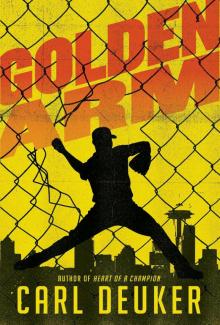 Golden Arm
Golden Arm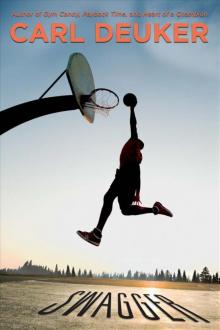 Swagger
Swagger Gym Candy
Gym Candy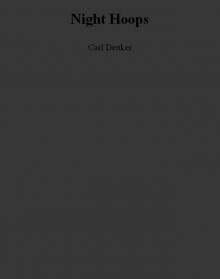 Night Hoops
Night Hoops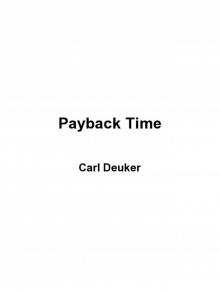 Payback Time
Payback Time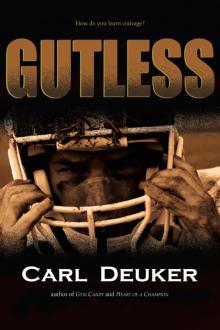 Gutless
Gutless Runner
Runner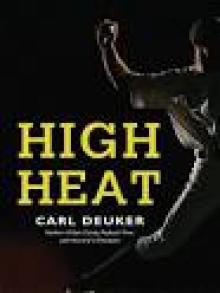 High Heat
High Heat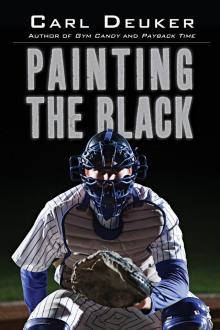 Painting the Black
Painting the Black